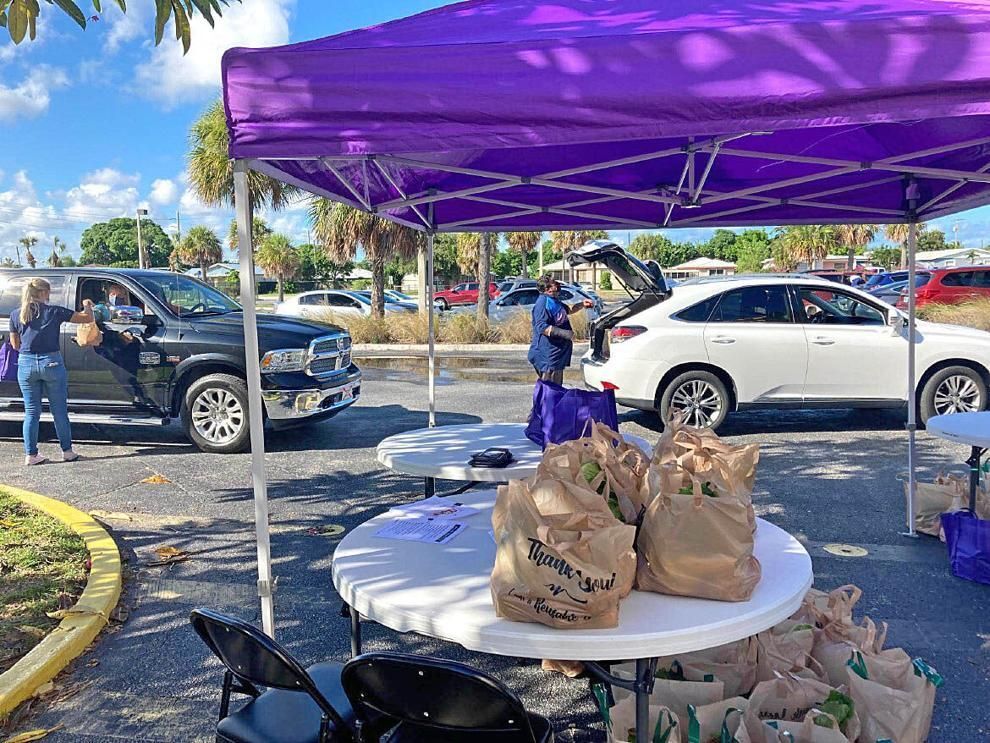
Editor’s note: This monthly series looks at the many programs that are financially supported by the Diocesan Services Appeal in the Diocese of Palm Beach. Donations to the DSA stay local, financing 47 Catholic initiatives within our five counties. The funding protects the most vulnerable among us, from the unborn child to the elderly, provides food for those who are hungry, sustains our Catholic schools, supports seminarians preparing for the priesthood and much more. This installment in the series explores the Hunger, Homeless and Outreach program of Catholic Charities.
RIVIERA BEACH | Even though the Hunger, Homeless and Outreach program of Catholic Charities has “homeless” in its name, it is more about preventing homelessness than serving those who are homeless. As displayed in its name, the program begins by addressing the issue of hunger among struggling residents.
“Anybody coming to Catholic Charities to any of the programs to seek any type of assistance walks out with a bag of food,” said Rocio Lopez, program director of Hunger, Homeless and Outreach. “Usually, we try to put in enough food for three family meals. It all depends on how much we’re getting from the Palm Beach County food bank.”
The program operates out of two Palm Beach County locations: St. Francis Center, 100 W. 20th Street in Riviera Beach, and St. Mary Center, 1200 E. Main Street in Pahokee. Since April, both sites have distributed food twice a month as part of a special grant. When that grant ends in June, he food distribution will switch back to a monthly program in Riviera Beach, but the Pahokee effort is a little different, Lopez said.
The Pahokee center, which is also affiliated with St. Mary Parish, offers an open pantry, she said, meaning that people can come in every week to get food.
“Aside from getting food for the families, we have children registered for what is called the Angel Food SNAC backpack program,” Lopez said. On Fridays, nearly 60 children receive enough food to eat on Saturdays and Sundays, two days they are not being fed at school. Previously, she said, students would come to school Mondays with little energy because they had barely eaten all weekend.
A clothes closet is also available in Pahokee for people needing clothing items and sometimes linens and towels, Lopez said.
At both locations, the Hunger, Homeless and Outreach program assists clients with applying for government benefits such as SNAP (food stamps) and Medicaid, Loopez added. The program partners with Florida Department of Children and Families, so clients can sign paperwork and bring documentation for proof of income. Establishing that personal connection with clients is a hallmark of the program, Lopez said.
When case managers talk with clients, they try to discover the struggles prompting the need for assistance. While a typical Hunger, Homeless and Outreach client is a single parent with one income, Lopez said caseworkers encounter all kinds of situations. Often the need for help involves the loss of employment, a hospitalization or lack of child support from a former partner.
“We try to do our due diligence by asking for documentation to support that need, to include pay stubs or a letter of termination,” Lopez said. “If they were hospitalized, can I see discharge papers from the hospital?
“We have to be very careful how we use our funds to be in compliance with grant requirements. We get audited, and the types of audits that we have, they get the pile of all the case folders and they go page by page making sure that we have all the documentation that we need to have,” she said.
Sometimes people miss a couple days of work, but they seek several months of rent, Lopez said. The case manager delves into the person’s situation to see if there are other factors that may be contributing to that need. The program’s money comes from local, state and federal grants to pay for rent, mortgage or utilities.
“Besides helping, we want to make sure that we’re empowering our clients to be self-sufficient and to regain financial stability, by setting short- and long-term goals to avoid the situation from reoccurring,” she said.
To develop a more long-term solution to clients’ financial problems, case managers help them create a budget. Bank documents offer a clear picture of how clients are managing their finances.
“With that bank statement, we categorize spending habits, and when we’re putting the budget together, we go over what is coming in and what is going out. Our goal is either to decrease expenses, if possible, or to increase income,” Lopez said. Perhaps the client doesn’t realize their level of spending on “luxuries” like eating out. It can be an eye-opener, she said.
Maybe a client’s water bill went up a lot because of a leak that their landlord hasn’t fixed, or he or she is paying for dental work and needs help paying the rent for a month. The Hunger, Homeless and Outreach program takes a holistic approach to help clients, Lopez added. If they need other services from Catholic Charities or other local agencies, case managers refer them.
Lopez, who has been with Catholic Charities for seven years, said the need for assistance is immense. Much of the hardship she has seen in the last six to eight months, she said, has been caused by rent increases. And the population needing assistance is changing.
“It’s not the people who are on welfare. It’s people with two incomes in the household with good jobs, but whose rent increased by a thousand dollars a month,” Lopez said.
More of those historically stable families are now living in their car, she said. If they got evicted, renting another apartment will be more difficult, and “most likely the apartment that they find is going to be more expensive than the one they had. It’s not a crisis anymore, it’s an emergency in our county.”
Social service agencies, like Catholic Charities, advocate for their clients to try to fix this situation. Most often, the agencies are willing and have money to help, but affordable housing is hard to find, she said.
With her staff (two full-time in Riviera Beach, one full-time in Pahokee and two part-time employees), Lopez fields as many as 900 calls a month from people needing assistance at 561-345-2007. Calling back those potential clients who leave messages is a major part of their job, she said.
For the 2020-21 fiscal year, Hunger, Homeless and Outreach assisted 391 households and provided more than $500,000 in assistance (rent, mortgage and utilities), she said. “We do what we can, one family at a time.”
So far in the 2021-22 fiscal year, Hunger, Homeless and Outreach has distributed 3,589 bags of food to clients, feeding 11,663 people. Through the monthly or bimonthly community food drives, they have aided 3,357 households with 12,981 people, offering meats, cheese, bread, peanut butter, vegetables and fruits.
With help from the Diocesan Services Appeal, Catholic Charities’ Hunger, Homeless and Outreach program assists those who are experiencing hard times.
“It wouldn’t do anything to get all these grants if I didn’t have the staff to work them, and thanks to the DSA we are able to pay our staff so that they can then provide the case management and they can provide the assistance that all these people in the community are seeking,” Lopez said. “I don’t know what we would do without the DSA.”
Catholic Charities is known in the area for being a good steward of the grant money it receives, she said. But ultimately, it is God who provides. “I know that he always does, and he gives us the energy to do the job that we do and provides the best cases,” she said. “I always tell my staff, we’re not here to judge. We’re not here to ask questions why. This is an opportunity for engagement. How can we help change this person’s outcome?”
Thanks to the generosity of Diocesan Services Appeal donors, the Hunger, Homeless and Outreach program is supported by the Diocese of Palm Beach. The faithful’s participation in the appeal is a vital part of the diocese’s ability to provide these services. For more information about Catholic Charities’ Hunger, Homeless and Outreach program, visit www.ccdpb.org. For details on the DSA and how to donate, go to www.DiocesePB/DSA
To read this article and others in Florida Catholic, click here.

